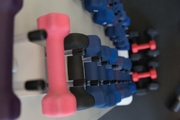ATCs in ACTION with COVID-19

Each March, the message we continually try to portray about Certified Athletic Trainer’s (ATCs) is that they are diverse health care professionals. What makes them diverse is their training and background. From emergency & acute care to rehabilitation of athletic injuries to managing the psychological components of rehab to nutrition and everything in between. ATC's are trained to triage, handle chaos, & manage multiple athletes at once and above all, stay calm, cool, & collected while being able to make decisions about the safety of their athletes and those around them. With that being said, the current international pandemic of COVID-19 is no exception for ATC’s and here is why.
What makes ATCs capable of helping?
ATCs are trained to triage and respond to emergency situations. Being on the sidelines, you are not only preparing yourself for an ACL tear or an athlete to sustain a head injury, you also need to be prepared for mass events to occur. ATCs are integrated into professional teams, high school teams, and collegiate teams. Therefore we find ourselves in arenas, football stadiums, soccer stadiums, Olympic stadiums, or assisting in the medical tent for the Boston Marathon. Any level of sports participation where there is a large gathering of people, an emergency situation could present itself, not only putting you and your team at danger, but thousands of fans, officials, coaches, and family members, and we are expected to be ready to respond and help those around us.
I recently attended a seminar at the Eastern Athletic Trainers Association Symposium in January 2020 - The Emergency Care Summit for Athletes. This conference had several presenters and each & every one of them spoke about what to do in mass events pertaining to the role of ATCs and their ability to do the following: triaging, assessment of airway/proficiency with airway interventions, controlling blood loss, how to pack gun wounds, ability to assess & screen for heat related illness, and how to protect your teams, fans, and family members during these events. The presenters spoke about events from the Chicago Marathon, one of the largest events held in the nation, to bus crashes, & school shootings, and ultimately how to react to not only predictable events, but the unpredictable events.
Being an ATC, I personally have not been on the sidelines for over 5 years now (as my career has taken me into body movement and mechanics/strength training) and it was an excellent symposium because it was a reminder that we are an integral health care professional that has the knowledge, skill set, ability, and training to actively contribute to our country, athletes, and patients especially in times of crisis.
What are ATC’s currently doing to help during COVID-19 crisis?
ATCs across the country that are employed by hospitals or physician practice are helping by screening patients for the flu and COVID-19.
The National Athletic Training Association is currently encouraging all ATCs around the country to do the following in response to COVID-19:
- If you are an ATC working in the hospital, physician practice, health care system, or related settings, we encourage you to communicate your capabilities to assist your employer in COVID-19 related solutions.
- If you are an ATC who finds you are temporarily separated from your daily duties and patient populations in settings such as secondary school or collegiate, please consider reaching out to your local and regional health care entities about your capabilities and availability as a health care provider.
To learn more about what ATCs are doing during this time or what other areas they cover, please visit NATA.org


